|
|
|
Sort Order |
|
|
|
Items / Page
|
|
|
|
|
|
|
| Srl | Item |
| 1 |
ID:
173866
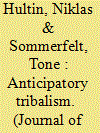

|
|
|
|
|
| Summary/Abstract |
This article examines the upsurge in denunciations of ‘tribalism’ in public debate during The Gambia's transition from the autocracy of Yahya Jammeh to the ‘New Gambia’ under President Adama Barrow. In these public debates, derogatory statements about particular ethnicities articulate fears of present or future alliances to monopolise political power. These fears are disproportionate to attempts of organised political mobilisation on ethnic grounds, which remain marginal. It is argued that accusatory politics are a salient, and neglected, feature of ethnic dynamics in contemporary Gambian – and African – politics. This politics of accusation involves the contestation and negotiation of moral legitimacy in the political sphere, in a manner challenging the separation of the moral and the political undergirding scholarly distinctions between ethnicity and tribalism.
|
|
|
|
|
|
|
|
|
|
|
|
|
|
|
|
| 2 |
ID:
115351
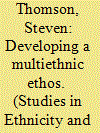

|
|
|
|
|
| Publication |
2012.
|
| Summary/Abstract |
This examination of local government reform in The Gambia asserts that - contra Mamdani's (1996) generalisations that colonial policies of indirect rule in Africa universally determined that ethnicity is the master code through which ordinary people interact with local manifestations of the state - in some cases colonial administration contributed to more pluralist local politics. Further, I argue that the logics of developmentalism have joined with local models of political legitimacy to generate communities that actively choose to define themselves explicitly as multiethnic entities. My case study focuses on the process conducted in one village of drafting a constitution for its Village Development Committee in anticipation of the Local Government Act of 2000. That a local community took advantage of such a critical juncture to reassert its own moral order is not surprising; however, that this local moral order explicitly recognises and protects ethnic diversity runs counter to dominant narratives about Africa that equate ethnic diversity with conflict.
|
|
|
|
|
|
|
|
|
|
|
|
|
|
|
|
| 3 |
ID:
156544
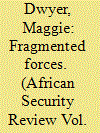

|
|
|
|
|
| Summary/Abstract |
This article provides a detailed look at the history of the Gambia Armed Forces (GAF), a military that has received very little academic attention within the study of African state security forces. It identifies key turning points in the GAF’s history, and highlights the vastly different roles the military played in the state under President Jawara (1965–94) and President Jammeh (1994–2017). Yet, it also highlights important similarities regarding internal patterns within the armed forces and shows the ways in which these continuities may challenge attempts to restructure the security sector. The article draws on archival research and interviews conducted with retired and active duty Gambian military personnel, government officials, and Gambian scholars.
|
|
|
|
|
|
|
|
|
|
|
|
|
|
|
|
| 4 |
ID:
093951
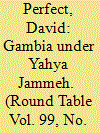

|
|
|
|
|
| Publication |
2010.
|
| Summary/Abstract |
This article assesses the rule of President Yahya Jammeh of The Gambia who came to power in 1994 following a military coup that overthrew the country's first president, Sir Dawda Jawara, and is now one of Africa's longer-serving political leaders. Following a description of key political developments since 1994, the article examines why Jammeh has won three presidential elections since 1996. It then assesses his government's record in terms of social and economic developments and human rights and considers its foreign policy stance, including its relations with the Commonwealth. The paper concludes by assessing Jammeh's future prospects.
|
|
|
|
|
|
|
|
|
|
|
|
|
|
|
|
| 5 |
ID:
081225
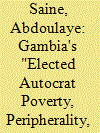

|
|
|
|
|
| Publication |
2008.
|
| Summary/Abstract |
This article assesses "democratization" under military and quasimilitary regimes in the Gambia following the 1994 coup d'état until 2006. The "transition" program back to "civilian" rule in 1996, the 2001 and 2006 presidential elections, and the aftermath of deepening authoritarianism and economic crisis are also evaluated. The formation of a five-political party coalition, the National Alliance for Democracy and Development, in 2005 raised expectations for a new political dispensation. Its breakup in 2006, however, dashed hope of this occurring. President Jammeh won a third 5-year term amid suffocating external and domestic indebtedness, declining exports, poor economic performance, and endemic corruption. Continued poor leadership and policy choices are likely to exacerbate abject poverty, countercoups, instability, and conflict. McGowan's neo-Marxist/liberal political economy approach has helped rekindle more critical scholarship on the linkage between underdevelopment and conflict in Africa and the Third World as well as provide an antidote to neo-liberal economic policies.
|
|
|
|
|
|
|
|
|
|
|
|
|
|
|
|
| 6 |
ID:
167098
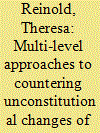

|
|
|
|
|
| Summary/Abstract |
This article assesses the impact of multi-level approaches to the problem of unconstitutional changes of government (UCGs) on the rule of law at the national and global level. Based on a single-case study of the 2016 Gambian UCG, this article concludes that multi-level governance tends to strengthen the rule of law at the national level, but only if certain conditions are met. These include an agreement about the rules of the road regulating how the different layers of governance interact – subsidiarity v. precedence for organizations from higher levels of governance – and the definition of a common purpose. Such unity of purpose is easier to attain if the (geo)political stakes of a crisis are relatively low, the prospects of success of a military intervention high, and if the perpetrators of the UCG have forfeited their legitimacy both locally and globally. This prevents them from exploiting institutional rivalries and shrinks their space for diplomatic manoeuvre and thus their ability to use forum shopping for their benefit. If these conditions are met, then multi-level responses to UCG will strengthen the rule of law at the domestic level, while at the same time potentially undermining the rule of law at the global level.
|
|
|
|
|
|
|
|
|
|
|
|
|
|
|
|
| 7 |
ID:
186847
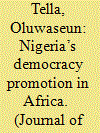

|
|
|
|
|
| Summary/Abstract |
Democracy promotion is undoubtedly one of Nigeria’s most important foreign policy objectives in Africa. Indeed, it has featured in the state’s foreign policy across successive administrations including military and civilian regimes. A fundamental question explored by this article is the dimension of power Nigeria deploys in its foreign policy objective of democracy promotion in Africa. Is it hard or soft, or a combination of the two (smart power)? Using three case studies – Sierra Leone, São Tomé and Príncipe and The Gambia – the article reveals that Nigeria has deployed all three dimensions of power. While this reflects the peculiar circumstances of these particular states in constitutional crisis, Nigeria’s domestic situation, including the type of political system (democratic or authoritarian) and the personality of the president at a given time, as well as trends in the global arena, are also germane. By its very nature, democracy promotion depends on a state’s soft power as the admirable domestic values of the soft power state attract other states to emulate its democratic practices. However, as the case study of Nigeria shows, a state can deploy soft, hard or smart power in its quest to promote democracy depending on the domestic circumstances of both the soft power and recipient states.
|
|
|
|
|
|
|
|
|
|
|
|
|
|
|
|
| 8 |
ID:
191439
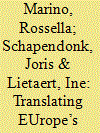

|
|
|
|
|
| Summary/Abstract |
The end of a long-standing autocratic regime in The Gambia renewed EUrope’s geopolitical interest in the externalisation of (return) migration management to the West African country. Since 2017, EUrope has financed several programmes implemented by a combination of international and local actors. Analysing original qualitative data through the lens of the sociology of translation (SoT) offered by actor-network theory (ANT), this paper explores the incorporation of locally owned civil society organisations (CSOs) within the socio-material network of externalisation. As such, it engages with the understudied perspective of Southern implementers in the context of migration management. In our analysis, we put central two notions of SoT: interessement and enrolment. With the first, we show how the development and migrant-protection interests of locally owned CSOs are brought in alignment with the EUropean objective of curtailing irregular migration. This process of interessement is never complete, but leaves room for excess positions, which here correspond to the locally owned CSOs’ criticism of EUrope’s appropriation of Gambian natural resources, practical organisation of migration management and excessive immobilisation of Gambians. The notion of enrolment refers to the processes of negotiation addressing part of these excess positions. Even with enrolment being successful, locally owned CSOs keep imagining, and to some extent, performing alternative ways of dealing with migration. Such alternative thinking and practicing will overtake the EUropean only if multiple and stable connections arise around it. Our ANT-driven analysis demonstrates that local implementers endorse EUropean migration management because they broadly see it as beneficial; yet, with their criticism, requests and imagination, manage to limitedly alter it, and may, potentially, transform it.
|
|
|
|
|
|
|
|
|
|
|
|
|
|
|
|
|
|
|
|
|